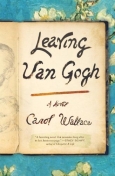BKMT READING GUIDES
Leaving Van Gogh: A Novel
by Carol Wallace
Hardcover : 288 pages
2 clubs reading this now
1 member has read this book
Introduction
In the summer of 1890, in the French town of Auvers-sur-Oise, Vincent van Gogh shot himself in the chest with a revolver. He died two days later, at the age of thirty-seven, largely unknown despite having completed over two thousand works of art that would go on to become some of the most important and valued in the world.
In this riveting novel, Carol Wallace brilliantly navigates the mysteries surrounding the master artist’s death, relying on meticulous research to paint an indelible portrait of Van Gogh’s final days—and the friendship that may or may not have destroyed him. Telling Van Gogh’s story from an utterly new perspective—that of his personal physician, Dr. Gachet, specialist in mental illness and great lover of the arts—Wallace allows us to view the legendary painter as we’ve never seen him before. In our narrator’s eyes, Van Gogh is an irresistible puzzle, a man whose mind, plagued by demons, poses the most potentially rewarding challenge of Gachet’s career.
Wallace’s narrative brims with suspense and rich psychological insight as it tackles haunting questions about Van Gogh’s fate. A masterly, gripping novel that explores the price of creativity, Leaving Van Gogh is a luminous story about what it means to live authentically, and the power and limits of friendship.
Editorial Review
A Letter from Author Carol Wallace |
 Dr. Gachet |  Vincent van Gogh |
Are you a longtime fan of Vincent van Gogh? If so, youâ??re a step ahead of me. Iâ??ve always loved art and haunted museums, but until I wrote Leaving Van Gogh I could walk past Vincentâ??s paintings with only a passing glance.
Even now Iâ??m a little bit surprised that Iâ??ve written a novel about him. I came across Dr. Paul Gachet while I was researching my masterâ??s thesis in art history, back in 2005. Gachet was a doctor who treated mental illness in Paris in the late 19th century, and was also a friend of many of the great painters of the era. He seemed like a terrific subject for a novel. I thought Iâ??d write about his collection of paintings, many of which ended up at the Musée dâ??Orsay.
And what happened? Vincent van Gogh hijacked the narrative. As I was writing, Vincent walked into Dr. Gachetâ??s sitting room in Auvers, France, a village northwest of Paris. He put down his portable easel and paint box, and started to talk. The focus of the novel shifted from the doctorâ??s pictures to the painterâ??s pain. Well, you can understand why. We novelists are looking for drama. We need pressure and conflict. Vincent van Gogh, in May of 1890, was a man under terrible strain. He wanted more than anything else to paint. But he had been mentally ill, confined to an asylum for a year, and he knew that he was still menaced by his demons. That, obviously, was my story.
But before I could write the whole book I needed to do a lot of research. When it became clear that Vincent was going to be the star of the show, I started to read his letters and that is how my affection for him took root. He was such a stoic. He endured such anguish, and scarcely complained. He believed in his art when only his brother Theo and Dr. Gachet shared his enthusiasm. He wrote to Theo, â??It is my earnest hope that I am not working for myself alone.â?? He never knew how much he would matter to us all.
Dr. Gachetâ??s side of the story fascinated me, too. It was a period before doctors had many tools to deal with mental illness, but Gachet took a humane and sympathetic stance toward his patients. A man who had always been fascinated by melancholy, he was in some ways the ideal physician for Van Gogh. He was certainly one of Vincentâ??s greatest fans, even after the painterâ??s death.
Discussion Questions
No discussion questions at this time.Book Club Recommendations
Recommended to book clubs by 0 of 0 members.
Book Club HQ to over 90,000+ book clubs and ready to welcome yours.
Get free weekly updates on top club picks, book giveaways, author events and more








